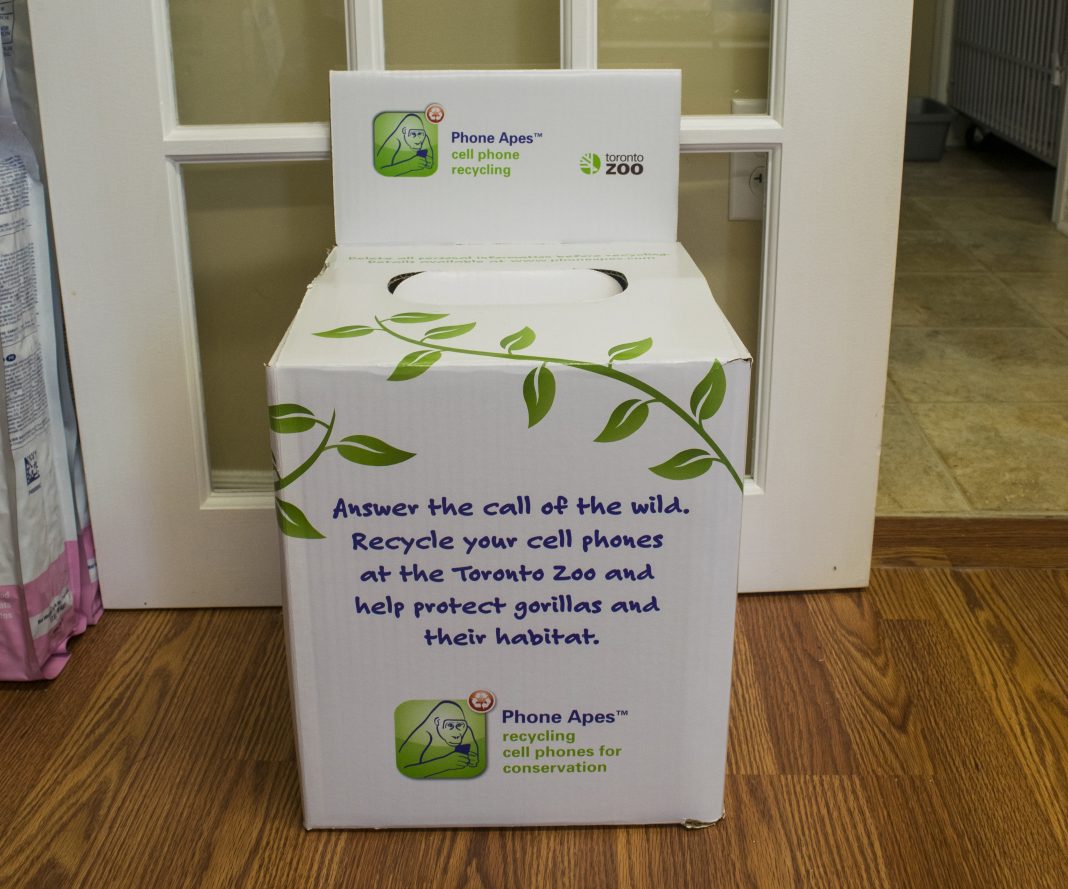MINDEMOYA – As technology continues to spread into more facets of life, more and more waste is generated when these devices become obsolete—a problem that only grows more dire by the day. It can be difficult to know what to do with old electronics, so an Island veterinarian has partnered with the Toronto Zoo to offer a solution that might make Islanders go ape.
“I ordered two (electronics recycling) boxes to be situated at Island Animal Hospital and Little Current Veterinary Services so that if individuals are wondering, ‘where oh where can I dispose of my old phone,’ they now have two convenient locations,” says Dr. Janice Mitchell.
The Toronto Zoo has run its ‘Phone Apes’ program since 2006 and it has since grown to become a leading cell phone recycler in Toronto, winning top awards for its program in 2007 and 2009. The zoo offers recycling that ensures every component of old cell phones end up out of landfills and it has partnered with numerous groups throughout Ontario to offer collection boxes.
The program is named after the Grauer’s gorilla, a species which lives exclusively in eastern Congo and is under threat. Coltan is a mineral that’s crucial to the manufacturing process of circuit boards and it’s principally found in these sensitive environmental regions. Dr. Mitchell says the miners are often poorly compensated so, in addition to harming the gorillas’ natural habitat, the miners frequently turn to the gorillas for bush meat.
“Eighty percent of the worldwide supply of coltan is from that one spot in Africa. We are so dependent on technology these days; it’s pervasive in our culture and it also becomes obsolete so fast. It’s nice to know we can continue to recycle so we’re not continuing to harvest it, destroy habitat, harm the apes and keep funding these wars,” says Dr. Mitchell.
The refined coltan used in manufacturing can be salvaged from old technology and reused in the creation of new devices. This is further encouragement to participate in the program, considering its high degree of effectiveness. Dr. Mitchell says it forms an important aspect of global citizenship, in addition to its environmental impacts.
“Everyone can play a role. People are getting doubtful and pessimistic, people are becoming negative about the future. But you can do something, play a role, even if it’s just a small part,” she says.
Recycling programs and other environmentally conscious initiatives tend to only be as successful as the amount of extra work required of individuals to partake in the service. Many a recycling program has failed due to being perceived as an inconvenience to those who may prefer to simply toss their old technology in the trash. For this reason, Dr. Mitchell has established collection boxes at the both Island Animal Hospital in Mindemoya and Little Current Veterinary Services.
“A lot of times with recycling programs, it’s extra work for people who say they don’t have the time for that. If we can have two easy locations open six and three days a week, hopefully it makes this into something they feel they can do,” says Dr. Mitchell.
Dr. Mitchell has worked at other vet clinics in southern Ontario who have offered the service. She noticed a lack of electronics recycling programs on the Island and decided to bring the idea North.
Between 2007 and 2014, the Toronto Zoo has collected 23,871 cell phones—in other words, an average of nearly 10 cell phones on every single day during that timeframe. The recycling organization that processes the zoo’s collected phones, GEEP (Global Electric Electronic Processing) breaks down all the materials in electronics and deals with them appropriately.
The zoo requests that all donors wipe their devices clean before donation and cancel any service plans that may exist on the devices. If they encounter data that has not been erased, the zoo promises complete confidentiality and will obliterate the leftovers. The program also collects donations for field conservation works in support of great apes.
The Island Animal Hospital in Mindemoya is open weekdays from 8:30 am to 5 pm and Saturdays from 8:30 am to noon. The Little Current site is open on Mondays, Wednesdays and Fridays from 9 am to 5 pm. Cell phones can be dropped off in the specially marked collection boxes on-site during business hours. When full, Dr. Mitchell will transport the devices down to the zoo.





